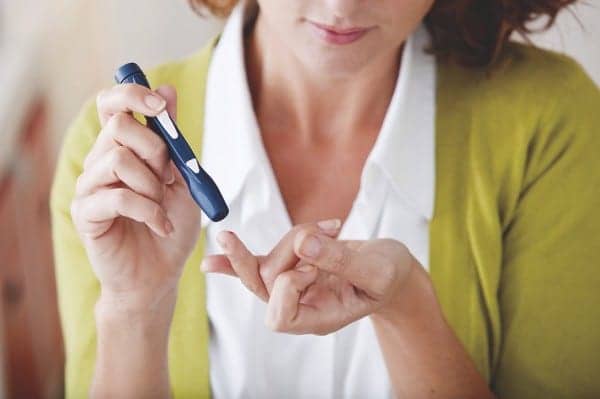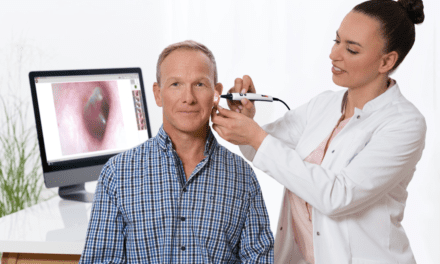Research | January 2016 Hearing Review
Hearing health should be part of the “standard of care” for people with diabetes
Early diagnosis and intervention of hearing or listening related problems could help in providing better quality of life for individuals with diabetes mellitus. Annual evaluation by cardiologists, podiatrists, ophthalmologists, and others are considered as the “standard of care” for these individuals. Annual audiological evaluation—which includes tests of the peripheral as well as central auditory system—should also be added to this list.
Diabetes mellitus is a multisystem disorder related to carbohydrate metabolism which occurs because of absolute or relative insulin deficiency. Along with metabolic disturbance, various pathologic changes in the human body are associated with diabetes. The disorder is characterized by elevated blood sugar levels and abnormalities in insulin secretion, which lead to alteration in metabolism of carbohydrates, proteins, and fats. Instead of providing nourishment and acting as structural components in the cell, these nutrients remain in the bloodstream. Their accumulation results in damage of micro and macro vascular damage that can lead to organ system failure.

Diabetes and Hearing Health
Previous literature reported that the most common hearing impairment seen in diabetes mellitus is a progressive bilateral sensorineural hearing loss of gradual onset, which mainly affects higher frequencies, similar to age-related hearing loss.1 The hearing loss may also be unilateral, sudden, with and without vestibular disorder.
Evidence shows that the endolymphatic sac vasculature plays an important role in pathogenesis of sensorineural hearing loss.2,3 The main cause of hearing loss in diabetic patients is poor blood flow (vascular insufficiency) to the cochlea. Uncontrolled diabetes may cause vasculopathy in the stria vascularis of the cochlea. Researchers have reported diffused thickening of the basilar membrane observed in vascular endothelium, which is called diabetic microangiopathy.4,5 Microangiopathy is responsible for hearing loss in diabetic individuals6,7 with the participation of smaller vessels in the inner ear that leads to hypoxia and causes hearing loss.4,8
Maia et al9 reported that diabetic neuropathy and microangiopathy can cause high frequency hearing loss. Hearing loss in the high frequency region suggests that the cochlea may have been damaged by angiopathy in the stria vascularis, spiral ligament, and edema (fluid accumulation) in the stria vascularis leads to poor frequency and intensity coding.10,11,12 It also has been observed that hearing loss can be present at all frequencies from 250 Hz to 8,000 Hz in diabetic individuals.8
A study in 2014 by Bajaj et al13 reported poor speech perception in noise among diabetic patients. The researchers also reported that individuals with diabetes exhibited decreased QuickSIN performance as compared to individuals without diabetes. The study suggests that poor performance at the brainstem, as well as the cortical level, results in decreased Quick SIN performance in individuals with diabetes mellitus.
Researchers also reported poor auditory brainstem response with prolonged latencies of wave III, V, and greater inter-peak III-V, I-III, I-V in diabetic individuals at 90 dB,14 which further suggests involvement of the relay station of different order neuron in the central auditory nervous system. In this same study, otoacoustic emissions (OAE) in diabetic individuals also showed early changes in micromechanical properties of outer hair cells and poor auditory evoked brainstem responses in diabetic population. Sharma et al15 reported the occurrence of delayed wave latencies of auditory brainstem responses (ABR) in people with diabetes were 64%, 72%, and 84% at 2 kHz, 4 kHz and 6 kHz respectively, which suggests involvement of the central neural axis. This study also suggests that ABRs carried out at higher frequency, like 6 kHz, can be used for early detection of central involvement in individuals with diabetes.
The audiological literature includes mention of multiple lesions in the area of the pons and thalamus in patients with diabetes,16 and central neuropathy in type 2 diabetes mellitus.17 Bajaj et al13 documented deficits in auditory processing abilities in diabetic patients, possibly due to involvement of various structures within the CNS that would lead to reduced speech perception abilities.
Similarly, McCrimmon et al18 showed poor temporal and auditory processing in individuals with diabetes mellitus. A similar study by Sommerfield et al19 revealed that tests of immediate verbal and visual memory were significantly poorer during hypoglycemia.
The adverse effect of hypoglycemia on working and delayed memory was more profound. Strachan et al20 reported disruptive effects of acute hypoglycemia on sensory information processing in diabetic adults. McAulay21 investigated attentional functioning in individuals with diabetes mellitus type 1. The result showed hypoglycemia caused a significant deterioration in tests sensitive to visual and auditory selective attention.
A study done by Gold et al22 showed significant deterioration in cognitive function in individuals with hypoglycemia. It was also observed that hypoglycemic seizures had a decrease in scores on tests assessing memory skills, including short term memory and memory for words.22 Poor auditory processing skills may cause poor speech perception in these individuals in quiet as well as noise.
The literature shows the deleterious effects of diabetes mellitus on the peripheral, as well as central, level of the auditory system. Brainbridge et al23 has stressed the importance of early audiological evaluation from the peripheral to central level of the auditory system—which could provide incentives for adoption of control measures and monitoring of complications.
Professional Implications
Early diagnosis and intervention of hearing-related problems could help the hearing care professional in providing better quality of life in these individuals. Obviously, it is not the task of the audiologist to diagnose and treat diabetes. However, audiologists need to be aware of the factors related to diabetes, and adapt patient histories and recommendations accordingly, as well as have an understanding of the possible complications and medications associated with these patients. Annual evaluation by cardiologists, podiatrists, ophthalmologists, and others are considered as the “standard of care” for individuals with diabetes mellitus. Annual audiological evaluation—which includes tests of the peripheral as well as central auditory system—should also be added to this list.
References
-
Jorgensen MB, Buch NH. Studies on the sense of smell and taste in diabetics. Acta Otolaryngol. 1961;53(2):539-45.
-
Leone CA, Feghali JG, Linthicum FH. Endolymphatic sac: possible role in autoimmune sensorineural hearing loss. Ann Otol Rhinol Laryngol. 1984; 93(5):208-9.
-
Gussen R. Vascular mechanisms in Meniere’s disease. Theoretical considerations. Arch Otolaryngol. 1982; 108(9):544-9.
-
Malpas S, Blake P, Bishop R, Robinson B, Johnson R. Does autonomic neuropathy in diabetes cause hearing deficits?. NZ Med J. 1989; 102(874):434-5.
-
Konrad-Martin D, Austin DF, Griest S, Mcmillan GP, Mcdermott D, Fausti S. Diabetes-related changes in auditory brainstem responses. Laryngoscope. 2010;120(1):150-8.
-
Makishima K, Tanaka K. Pathological changes of the inner ear and central auditory pathway in diabetics. Ann Otol Rhinol Laryngol. 1971;80(2):218-28.
-
Costa OA. Inner ear pathology in experimental diabetes. Laryngoscope. 1967;77(1):68-75.
-
Wackym PA, Linthicum FH. Diabetes mellitus and hearing loss: clinical and histopathologic relationships. Am J Otol. 1986; 7(3):176-82.
-
Maia CA, Campos CA. Diabetes mellitus as etiological factor of hearing loss. Braz J Otorhinolaryngol. 2005;71(2):208-14.
-
Florentine M, Reed CM, Rabinowitz WM, Braida LD, Durlach NI, Buus S. Intensity perception. XIV. Intensity discrimination in listeners with sensorineural hearing loss. J Acoust Soc Am. 1993; 94(5):2575-86.
-
Nelson DA, Freyman RL. Psychometric functions for frequency discrimination from listeners with sensorineural hearing loss. J Acoust Soc Am. 1986; 79(3):799-805.
-
Schroder AC, Viemeister NF, Nelson DA. Intensity discrimination in normal-hearing and hearing-impaired listeners. J Acoust Soc Am. 1994; 96(5):2683-93.
-
Bajaj G, Puthuchery S, Bhat J, Ranjan R. Effect of type 2 diabetes on speech perception in noise. Int J Innov Res Dev. 2014;3(4):50-54.
-
Gupta R, Aslam M, Hasan S, Siddiqi S. Type-2 diabetes mellitus and auditory brainstem responses–a hospital based study. Indian J Otolaryngol Head Neck Surg. 2010;14(1):9-11.
-
Sharma R, Gupta SC, Tyagi I. Brain stem evoked response in patient with diabetes mellitus. Indian J Otolaryngol Head Neck Surg. 2000;52(3):221-229.
-
Nakamura Y, Takahashi M, Kitaguti H. Abnormal brainstem evoked potentials in diabetes mellitus. Evoked potential testing and magnetic resonance imaging, Electromyography. Neurophysiology. 1991;31(2): 243-249.
-
Toth F, Varkonyi TT, Rovo L, Lengyel C, Legrady P, Jori J and Kiss JG. Investigation of Auditory Brainstem Function in Diabetic Patients. Int Tinnitus Jour. 2003;9(2):84-86.
-
McCrimmon RJ, Deary IJ, Frier BM. Auditory information processing during acute insulin-induced hypoglycaemia in non-diabetic human subjects. Neuropsychologia. 1997;35(12):1547-53.
-
Sommerfield AJ, Ewing FM, Strachan MW, Deary IJ, Aitken G, Frier BM. Self-treatment of mild symptomatic hypoglycaemia by people with insulin-treated diabetes. Diabet Med. 2003; 20(8):686-687.
-
Strachan MW, Ewing FM, Frier BM, Mccrimmon RJ, Deary IJ. Effects of acute hypoglycaemia on auditory information processing in adults with Type I diabetes. Diabetologia. 2003;46(1):97-105.
-
Mcaulay V, Deary IJ, Sommerfield AJ, Frier BM. Attentional functioning is impaired during acute hypoglycaemia in people with Type 1 diabetes. Diabet Med. 2006;23(1):26-31.
-
Gold AE, Deary IJ, Macleod KM, Thomson KJ, Frier BM. Cognitive function during insulin-induced hypoglycemia in humans: Short-term cerebral adaptation does not occur. Psychopharmacology (Berl). 1995;119(3):325-33.
-
Bainbridge KE, Hoffman HJ, Cowie CC. Risk factors for hearing impairment among US adults with diabeties. Diabetes Care. 2011;34(7):1540-1545.
Himanshu Kumar Sanju is a Research Officer and Prawin Kumar, PhD, is a Reader in Audiology at the All India Institute of Speech and Hearing in Mysore, India.
Correspondence can be addressed to HR or Himanshu K. Sanju at: [email protected]
Original citation for this article: Sanju HK, Kumar P. Annual Audiological Evaluations Should Be Mandatory for Patients with Diabetes. Hearing Review. 2016;23(1):14.?








Thank you for this article, it is very good.